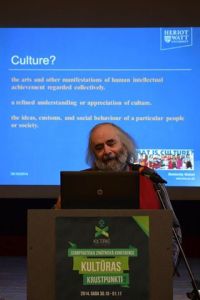“Sculpture, poetry, theatre – tell me,” says Didzis Meḷḳis, “does culture make any money?”
We are sitting in an office in the Latvian Academy of Culture: the International Editor of Dienas bizness, the business section of Latvia’s leading daily broadsheet, and I, Professor of Culture and Economy at Heriot-Watt, having just delivered a keynote at the Academy’s Cultural Crossroads conference as part of Riga’s year as European City of Culture.
“It depends,” I say, “what you mean by ‘culture’.”
If we think of it merely in terms of the cultural industries that since the mid-1980s have been seen as having replaced the money-spinning manufacturing industries of an earlier age, then it depends indeed on which part of the cultural industries we are looking at: some are lucrative cash cows, others are more like bottomless pits.
But that is not the best way of looking at culture and economy, and may even lead to entirely wrong conclusions. If culture is understood more broadly in what used to be anthropological terms (before ‘culture’ was ousted from much of anthropology in favour of ‘society’), then the utilisation of culture as a resource for development – which had been the topic of my keynote – can be realised as bringing significant benefits to society. However, many of these are not easily captured in monetary terms. There are examples where investment in cultural activities leads to a step change in local culture, understood more broadly, that raises the quality of life for all concerned.
Take Derry-Londonderry’s experience as UK City of Culture 2013, for example. It is early days yet, but all indications are that, whatever the immediate financial outcome, the city is a better place as a result of the year’s activities. Riga and Latvia, with their own ethnic tensions, take more than a passing interest in such conjunctions of culture and economy.

